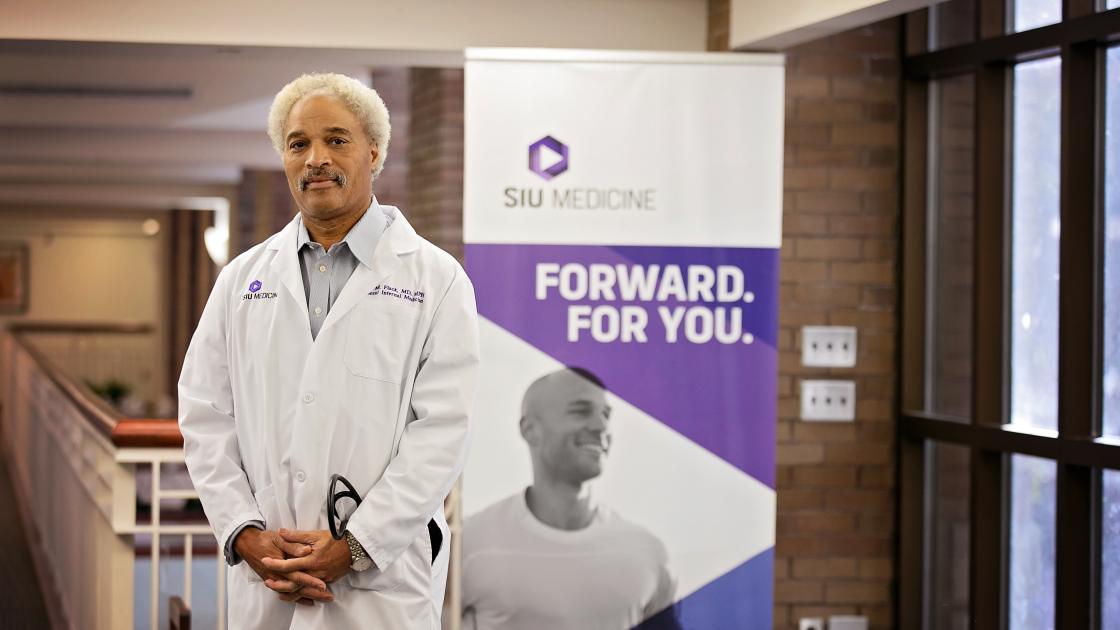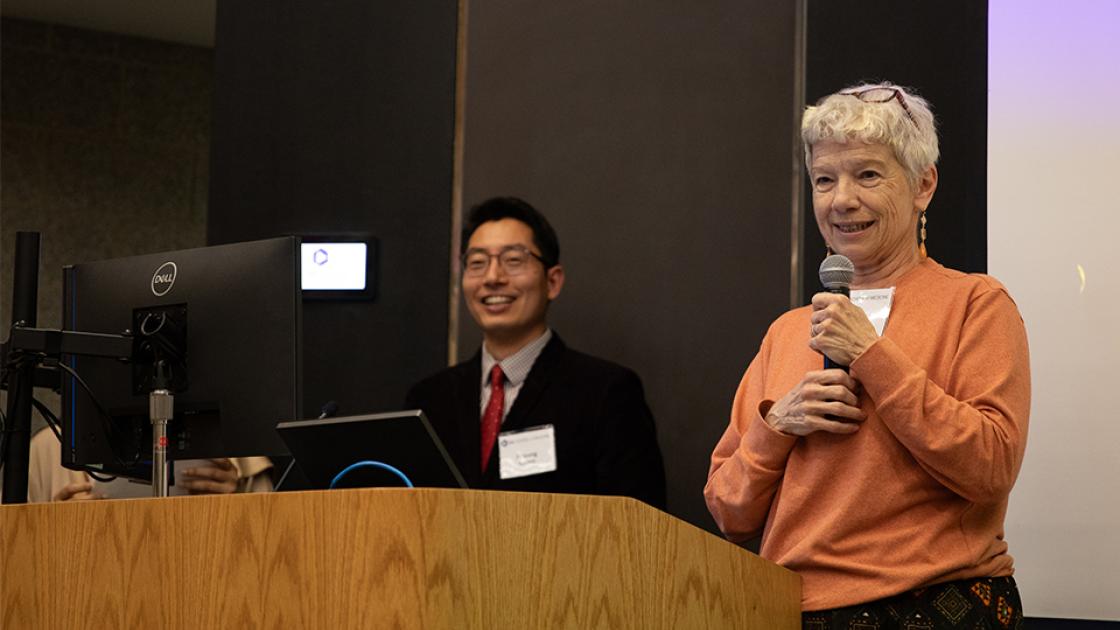
Meet John Flack
Constantly moving medical care upstream
Tucked in the far corner of John Flack’s finished basement is the fish room, a space filled floor to ceiling with aquariums — 135 of them, to be exact. Each provides a home to a breed of fancy guppies, small fish of every hue and variety, serenely checking on the neighbors and the guests who have entered their marine habitat.
This is a relaxing space for Flack. What started as a hobby at the age of 10 is now his “other full-time job,” one that requires ongoing care and high organizational skill. Fortunately for the exotic fish moving around the filtered tanks, Flack is adept at both. These attributes have also served him well in his primary role, as professor and the Sergio Rabinovich Endowed Chair of Internal Medicine at SIU School of Medicine.
In addition to teaching, mentoring and directing the department, Flack is a renowned and widely published physician and hypertension expert, with more than 200 peer-reviewed publications in his field. His practice focuses almost exclusively on the diagnosis and treatment of high blood pressure and related-cardiovascular conditions.
He keeps his eyes and ears open to what’s coming next, actively involved in testing new drugs and devices for hypertension. It’s both necessity and professional curiosity. Divisions under his direction treat more patients with chronic health problems than any other department at SIU Medicine. The status quo does not seem to hold his interest for very long.
“John likes learning and is not afraid to try new things,” says Susan Hingle, MD, his predecessor as interim chair of internal medicine. It is a mindset he has embraced throughout his life.
John M. Flack, MD, MPH, was born at Hill Air Force Base in Utah. He was adopted at the age of 18 months by a couple from Chickasha, Oklahoma. His father had an eighth-grade education and ran the auto body business he established in the 1940s. His mother had a master’s degree, and was a teacher and employment counselor during Flack’s youth.
His parents focused on their son’s education and inspired his love for learning. By the age of 5, he had already narrowed his career plans to two: doctor or astronaut.
An only child, Flack also enjoyed the camaraderie of sports. He played four sports in high school and was All-State in track his senior year. As an undergrad at Langston University, a Historic Black College near Tulsa, he played football and baseball while getting his BS in chemistry. Flack and teammate Melvin Hall were known for bringing textbooks onto the bus for away games. “Melvin is a successful attorney in Norman (Ok.) and former chair of the University of Oklahoma Board of Regents, so it worked out for him too,” Flack says.
Flack earned his medical degree at the University of Oklahoma College of Medicine in 1982. Like SIU, Oklahoma has a split campus. Years 1 and 2 are in Oklahoma City, and years 3 and 4 included the option to train in Tulsa. Flack remembers the period as sometimes stressful and a lot of work, but overall, “I had a blast. I was learning so much I was giddy.” Adding to his joy: he married his fiancée, Jennifer, and started a family while in medical school. The first of their five daughters, Courtney, was born at the end of the first semester of his second year in medical school, “the same day as my Laboratory Medicine final exam.”
His wife is now a corporate attorney. Three of their daughters still live in Oklahoma; the other two have homes in Houston. Between them, the Flacks have six grandchildren. A family man and a Sooners fan, he shares his season tickets with his daughters, and returns frequently to see them and go to the games together.
Following his internal medicine residency and a master’s in public health at Oklahoma, he seized a research fellowship opportunity in the epidemiology division at the National Heart, Lung and Blood Institute at the University of Minnesota School of Public Health. He moved his young family to Minneapolis in 1988.
The weather was a rude awakening for the Oklahoma brood. “There were times where it was so cold I felt like I’d stepped off a spaceship,” Flack says.
But he quickly warmed to the research training environment, working with a group of world-class cardiovascular scientists while earning an MPH in epidemiology. His early NIH-supported studies examined how diet and lifestyle affect the health of various racial, gender, age and economic groups, expanding the understanding of biomarkers and risk factors for cardiovascular disease. The experience came in very handy at his next post.
Flack spent the following three years in North Carolina as medical director of the Hypertension Center at Wake Forest’s Bowman Gray School of Medicine. There he managed care for a population riddled with severe hypertension.
Flack attributes it to the region’s culinary traditions. “The food in the South is really good, but it comes at a cost. If you’ve got any kind of tendency toward hypertension or diabetes, it will unmask it,” he says.
“A diet that’s loaded with fried foods and salt and sugar can be just as harmful as living in a food desert — your neighborhoods without access to fresh fruits and vegetables.”
In 1997, Flack joined the faculty at Wayne State University School of Medicine in Detroit. There his career track broadened from internal medicine, hypertension research and public health to encompass academic leadership.
During nearly two decades in the Motor City, Flack became chair of internal medicine and received numerous honors for his efforts to improve the lives of his patients, his workplace and the communities where he served. Recognition included the Crain’s Detroit Business Healthcare Hero Award for Outstanding Physician Achievement (2005), the American Heart Association F. Dewey Dodrill Award for Excellence (2007) and the Detroit News Michiganian of the Year (2009). In 2012, his alma mater, Oklahoma University School of Medicine, named Flack the Academic Physician of the Year.
He also learned how to work through adversity. The Detroit medical community was resource-poor and not always collegial. “It was tough to negotiate wins-wins, because there wasn’t much of a collaborative mindset,” he says.
The struggles to improve care while moving against the current strengthened his resolve. “I reached a point where I realized if I can survive this environment, I can make it anywhere,” he says.
A new state and a new state of mind
Coming onboard at SIU School of Medicine in 2015 brought another sea change for Flack. He had only a general notion of Springfield, despite driving past it numerous times on his commutes between Oklahoma and Detroit.
He found the people to be open and friendly, and Memorial Health System’s CEO Ed Curtis clear and direct in how he communicated the vision for a medical partnership.
Reflecting on his introduction to SIU Medicine, Flack says, “I can truly appreciate the value of having strong hospital partners in academic medicine, because I’ve seen the other end of the spectrum. With Memorial and HSHS St. John’s, we are fortunate to be one of the best supported schools in the country.”
His fondness for learning, research and modeling best practices made him an attractive candidate for the chair position. And the attraction was mutual. Flack considered SIU’s Center for Clinical Research to be another factor in his decision to relocate. He is currently involved in 10 active studies addressing cardiovascular disease, including an NIH-sponsored, multicenter, prospective cohort project that started in 2004.
“I know how expensive it can be to set up studies within a department. Establishing a center to share resources in a school this size was really smart,” he says.
A spirit of innovation drives medical research forward, and in Flack’s experience with hypertension, it is a key to advance patient care. He regularly participates in clinical trials that test interventional devices with the understanding that lifestyle changes are a difficult prescription for many individuals to follow.
With a durable device, compliance becomes less of an issue. “It helps to minimize the non-adherence to prescribed therapies,” he notes. “There is new data out that shows for every new hypertension prescription written, 20 percent are never filled. And for those that are started, by the end of the first year half the people have quit taking them.”
Rather than get discouraged, research scientists get creative. Devices provide a workaround that won’t replace drug therapy, but can serve as an adjunct treatment in those with significant hypertension, he says.
“Whether using diet and lifestyle, medications or devices, no single approach on its own is going to replace another.” His years in the lab have confirmed a complementary, team approach to care produces the best outcomes.
Leading by doing
Internal Medicine teams have grown substantially during Flack’s tenure. The department is one of the largest at SIU Medicine, with 80 faculty, 64 residents and 26 fellows.
Physicians and staff comprise 13 divisions: infectious diseases, rheumatology, endocrinology and metabolic disease, dermatology, cardiology, pulmonary medicine and critical care, gastroenterology and hepatology, medicine-psychiatry, nephrology and general internal medicine.
Most recently, Flack says, “Dr. [Zafar] Quader has rebuilt and energized GI, and Cardiology has expanded, with exemplary patient access thanks to Dr. [Joussef] Chami.”
Graduate Medical Education programs have also bloomed, with new fellowships in cardiology and hematology-oncology, an increase in the dermatology resident positions, and an evolving pulmonary-critical care fellowship.
Flack praises the faculty for the gains made, not only in the delivery of health care, but also while teaching the next generation of medical practitioners. “The multidisciplinary care within our clinics is truly special. These are dedicated people, doing their best,” says Flack.
He is justifiably proud of the department’s research output, too. In the past 12 months, IM faculty were investigators on 28 external grant-funded studies, and wrote ~100 scholarly articles and 6 books/book chapters, a marked increase since he assumed the helm in 2015.
Flack has personally contributed to the tallies. His Hypertension Research Group has had multiple successes. In 2019 the group published the first peer-reviewed data on the prevalence of refractory, difficult-to-control hypertension in the U.S. adult population (Journal of Hypertension, 2019). This year they published the first prospective outcomes data for adults with treatment-resistant high blood pressure in the premier hypertension journal in the world (Hypertension, 2021).
As chair, he has empowered employees and made some hard decisions to improve productivity. When the COVID pandemic closed IM clinics in March 2020, Chief of Rheumatology Sriya Ranatunga, MD, appreciated his quick action to convert in-patient visits to telehealth. “It was tremendously helpful in mitigating the spread of the virus, especially with our immunosuppressed patients. We’ve ended up with a welcome alternative that our clinic continues to offer.”
The divisions of Infectious Diseases and Pulmonary and Critical Care were on the front lines as COVID spread. ID Chief Vidya Sundareshan, MD, says Flack was extremely supportive of their division’s work throughout the difficult times of 2020. “Dr. Flack is an exceptional epidemiologist, and was regularly weighing in as part of a public health committee with other members of the school, higher education and the community.”
“He provided constant guidance, encouragement and feedback to us, always motivating us to get out of our comfort zones. Many times he’d say, ‘It’s OK to do more than what you’re used to doing; it helps you grow.’”
When the COVID vaccines first became available at SIU, vaccination rates in Internal Medicine were low. As chair, Flack prioritized the issue and led some successful interventions. “We ended up having an excellent rate of vaccination,” says Sundareshan. “He even put a sign on his door explaining why he got vaccinated — it was a strong but relatable message.”
Lucinda Buescher, MD, chief of the Division of Dermatology, says, “Dr. Flack has been supportive of innovative ideas, including using our program alumnus on short-term intervals. It led to recruitment of a new provider and will give patients better access to Mohs surgery.”
In addition, his advocacy for a change has been instrumental in improving the ease with which patients can contact several divisions, including dermatology, she says. Some central call center staff have been relocated within the internal medicine clinics to work among the staff and providers, which enhances their knowledge and abilities to address patient scheduling issues. “It’s a model that we had hoped for over the years, and his determination made it happen,” she says.
Flack has also emphasized diversity and equity within his leadership team. “Most of the members of my cabinet are women, three of us are African American, 3 of 9 division chiefs are women, and the former vice chair and associate vice chair for health equity are women, one of whom is African American,” he says.
The Department of Internal Medicine received the School of Medicine’s 2020 Kenniebrew Equity Award in recognition of its multitude of academic endeavors and community events that promoted diversity, respect and inclusiveness.
Internal Medicine’s size and growth does present some management challenges, however. Flack considers enterprise alignment as one that requires vigilance. “You’re trying to get the internal and external goals to line up in a consistent manner that makes the workplace better for training and meeting all your missions, within the school and with its partners. If you’re not careful, things can get out of sync. Then when you sum them all up, you haven’t gone anywhere. You’ve made no progress.”
To Flack, not making progress — not learning to do things better — is just treading water. Which may be fine if you’re a fish. But it’s not OK when you are a medical institution built to improve the health of people in central and southern Illinois.
The fish fancier
Dr. John Flack's interest in fish started in the fifth grade, with a teacher’s aquarium. For the past 30 years, he has been an active hobbyist, raising fancy guppies in his home.
The fish room has its own ecosystem, replete with a filtered water supply, monitored heat, humidity and lighting, a refrigerator, a dishwasher, sink, garbage disposal and shelves full of medications and chemicals for tank treatments.
“When I’m doing a good job, the maintenance requires a minimum of 20-plus hours a week. The great thing about being down there is the stress release. It’s something I know backwards and forwards, so I can get lost in the work. And trying to improve them and make better guppies gets to my competitive side.”
Flack is a member of the International Fancy Guppy Association and the Michigan Guppy Club. Whenever possible, he attends regional competitions and visit with the other clubs, or sends his fish by mail to be judged.
“It’s an interesting group, very diverse. You have folks there who are veterinarians, doctors, blue collar people and everyone in between, all converging for this single hobby: loving fancy guppies.”
His fish have won more awards than he can count. The trophies, plaques and ribbons are scattered throughout his home and workspace.
“One of the first times I was in his office I saw an award plaque for ‘best female in class,’” says Internal Medicine colleague Dr. Susan Hingle. “When I asked him about it, he didn’t realize that I was unaware the award was for his fish and not for him. It was humorous.”





